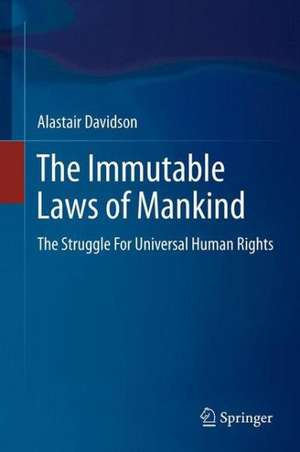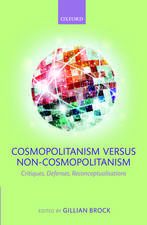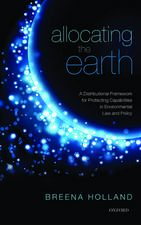The Immutable Laws of Mankind: The Struggle For Universal Human Rights
Autor Alastair Davidsonen Limba Engleză Paperback – 11 iun 2014
| Toate formatele și edițiile | Preț | Express |
|---|---|---|
| Paperback (1) | 1229.10 lei 6-8 săpt. | |
| SPRINGER NETHERLANDS – 11 iun 2014 | 1229.10 lei 6-8 săpt. | |
| Hardback (1) | 1235.25 lei 6-8 săpt. | |
| SPRINGER NETHERLANDS – 4 mai 2012 | 1235.25 lei 6-8 săpt. |
Preț: 1229.10 lei
Preț vechi: 1498.90 lei
-18% Nou
Puncte Express: 1844
Preț estimativ în valută:
235.19€ • 256.27$ • 198.18£
235.19€ • 256.27$ • 198.18£
Carte tipărită la comandă
Livrare economică 23 aprilie-07 mai
Preluare comenzi: 021 569.72.76
Specificații
ISBN-13: 9789401780896
ISBN-10: 9401780897
Pagini: 556
Ilustrații: XXXIV, 522 p.
Dimensiuni: 155 x 235 x 29 mm
Greutate: 0.77 kg
Ediția:2012
Editura: SPRINGER NETHERLANDS
Colecția Springer
Locul publicării:Dordrecht, Netherlands
ISBN-10: 9401780897
Pagini: 556
Ilustrații: XXXIV, 522 p.
Dimensiuni: 155 x 235 x 29 mm
Greutate: 0.77 kg
Ediția:2012
Editura: SPRINGER NETHERLANDS
Colecția Springer
Locul publicării:Dordrecht, Netherlands
Public țintă
ResearchCuprins
Prologue.- Chapter 1 A World without Rights.- Chapter 2 Eyes Turned Heavenwards.- Chapter 3 When the World was New.- Chapter 4 The Open Republic, or Kafka’s Doorman.- Chapter 5 Jack is Master in his own House: The Triumph of the Nation.- Chapter 6 Rousseau: A Mixed Legacy.- Chapter 7 Half Included: Human Rights and the Working Class.- Chapter 8 The Excluded: Women.- Chapter 9 The Excluded: Slaves.- Chapter 10 It Could Happen to Us. The Uniting Force of Genocide.- Chapter 11 True Believers: Human Rights in the Nineteenth Century.- Chapter 12 Fathering the Universal Declaration of Human Rights.- Epilogue.- Bibliography.- Index.
Textul de pe ultima copertă
The key question for the history of universal human rights is why it took so long for them to become established as law. The main theme of this book is that the attainment of universal human rights required heroic struggle, first by individuals and then by ever-increasing numbers of people who supported those views against the major historical trends. Universal human rights are won from a hostile majority by outsiders. The chapters in the book describe the milestones in that struggle. The history presented in this book shows that, in most places at most times, even today, for concrete material reasons a great many people oppose the notion that all individuals have equal rights. The dominant history since the 1600s has been that of a mass struggle for the national-democratic state. This book argues that this struggle for national rights has been practically and logically contradictory with the struggle for universal rights. It would only be otherwise if there were free migration and access to citizenship on demand by anybody. This has never been the case. Rather than drawing only on European sources and being limited to major literary figures, this book is written from the Gramscian perspective that ideas mean little until they are taken up as mass ideologies. It draws on sources from Asia and America and on knowledge about mass attitudes, globally and throughout history.
Caracteristici
Is provocative and intended to arouse debate among scholars and practitioners Gives historical context to the development of universal human rights Combines information and a thesis in a way not found in other English language texts Contests the Anglo-Saxon paternity of universal human rights ?












